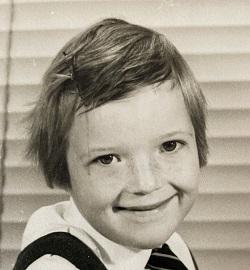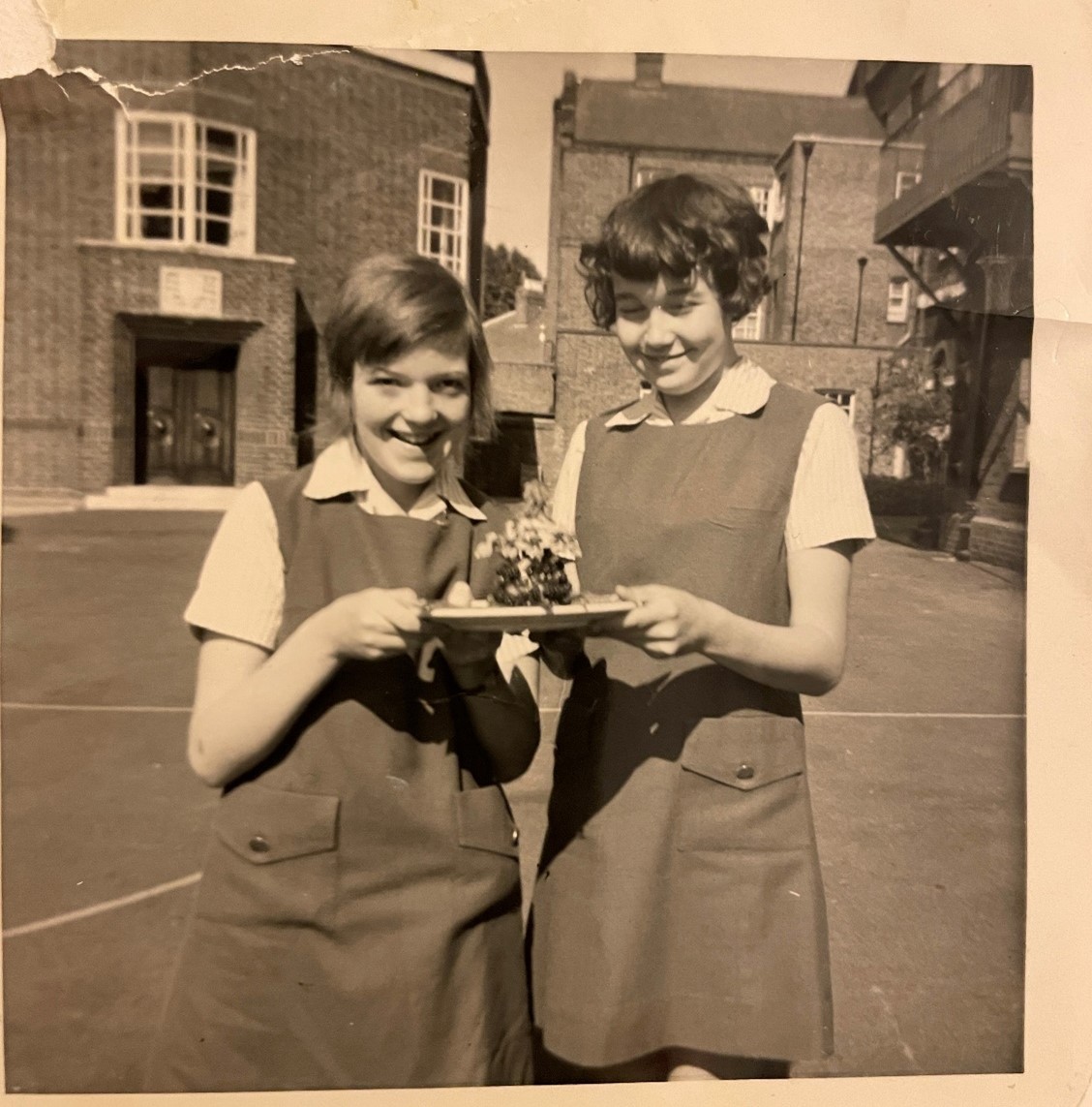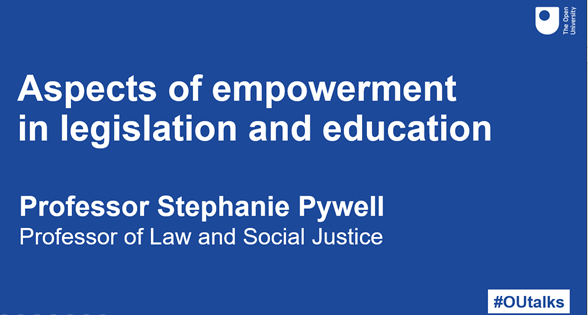A very tenuously Christmassy ‘sad story with a happy ending’*

(*Self-description of Janet and Allan Ahlberg’s Bye Bye Baby)
Once upon a time, there was a small, swotty girl with messy, short, brown hair. About 110 days before Christmas 1962, she put on a maroon-and-gold-striped tie for the first time.
Her education certainly wasn’t a straightforward path from primary school to university. Because she was such a very swotty little girl, her tie-loving headmaster suggested to her parents that she should go to a boarding school that would stretch her: Christ’s Hospital is a genuine charity – fees are non-existent or means-tested, and people can’t go there if their parents are rich. With her head full of Enid Blyton’s stories of midnight feasts and jolly japes at the picturesque (but, sadly, non-existent) Mallory Towers and St Clare’s, she passed the entrance exams, and her parents delivered her – plus a suitcase nearly as big as she was – to some listed buildings in Hertford 129 days before Christmas 1969.

When she got to Christ’s Hospital, she carried on being hopeless at all the things that make girls popular at boarding school – music, dancing, acting, sports, skipping, art and daring rule-breaking – but she did carry on swotting. One of her rare relaxations was tending a tiny rectangle of earth, optimistically termed a ‘garden’, just outside the Science Block. She and her co-horticulturist, Jane, constructed a ‘Space Age’-themed entry for a flower-arranging competition: it was a rocket-like sculpture made of mud, with home-grown marigolds stuck into it, and it was highly commended.
She did well in ‘O’ levels, but she was prescribed sleeping pills because she was revising for about ten hours a day, so her parents decided she’d be healthier if she left.
So she went from her strict, almost convent-like, boarding school to Stevenage College of Further Education, where – far greener than anything stuck into the mud-rocket – she was terrified of all the huge, lolling, smoking, twenty-something men who stood partly blocking all the corridors. For six overwhelming weeks, she studied for four ‘A’ levels, two ‘S’ levels (which were higher than ‘A’ levels) and Use of English, which was essential for Oxbridge. She worked until 10 o’clock every night, then cried because her marks rarely exceeded 80 per cent. So, again steered by her parents’ concern, she left education and started work.

She enjoyed four Saturdays as a Littlewoods cashier, before becoming a laboratory assistant, then an office junior – she had to sort the post and push a trolley round a huge office to deliver it. She learnt typing and shorthand, and eventually became a directors’ secretary with a status-defining, state-of-the-art IBM electric golfball typewriter.
Eleven days after Christmas 1979, after a whirlwind romance, she married a science teacher called Barry. He realised her achievements didn’t match her intellect, so he overruled her desire to be a dutiful wife who’d hand-scrub his shirt collars, and he secretly requested a prospectus from The Open University. For six long, tiring years, starting 38 days after Christmas 1981, she studied Science, Maths, Statistics and Economics, swotting for 12.5 hours a week for 30 weeks a year. Her closest friend generously hosted a surprise – but inaccurately named – ‘Goodbye to OU’ party for her 41 days before Christmas 1987.
Almost exactly half-way between Christmas 1987 and Christmas 1988, she graduated in Brighton Conference Centre. She was really proud of having B A after her name so – with the lack of logic she’d shown throughout her life – 145 days before Christmas 1989, she became a full-time mum to baby Alison Elizabeth, then trained as a volunteer tutor in adult basic literacy, and started a home-based word-processing business. Through the tutoring, the OU-graduate-turned-full-time mum met a dyslexic woman who was training to be a legal executive. The woman confided her worries about producing assignments, so the OU-graduate-turned-full-time mum word-processed them, correcting the grammar and spelling as part of the service. After the first one, she excitedly told Barry: ‘I’ve found what I want to study when Alison goes to school – law!’. So she studied for the ‘A’ level at evening classes when Alison went to nursery school, then for a Bachelor of Laws and PhD at the University of Hertfordshire while Alison was at primary school.
Thirty years after the mud-rocket, the full-time-mum-turned-doctor-of-philosophy got a lovely job in legal academic publishing, with a string of letters after her name. She was happy and fulfilled at work for six years, but she resigned following a nervous breakdown after Barry had recovered from ten months of life-threatening illness. She did freelance work, becoming an OU Associate Lecturer 38 days after Christmas 2008. She slowly recovered and, 37 days before Christmas 2013, she started a one-year fixed-term post as an OU Lecturer in Law. She was thrilled at finally having a job that enabled her to help students to have the life-changing opportunities that she’d taken advantage of 30 years earlier. She suffered from acute imposter syndrome, and was completely overawed by her new colleagues: she vowed to her boss – a senior professor for whom she had immense respect and admiration – that she could not, and would never try to, compete with such impressive people for promotion. Encouraged and supported by professors and other senior colleagues, she wasn’t true to her word, and she became a Fellow, then a Senior Fellow, of the Higher Education Academy, and – 85 days before Christmas 2019 – a Senior Lecturer in Law.
Nineteen days before Christmas 2022, the swotty-little-girl-turned-OU-graduate-turned-full-time-mum-turned-doctor-of-philosphy-turned-Senior-Lecturer-in-Law sat shaking, scarcely able to breathe, in the front row of a lecture theatre containing over 100 people, with about 150 people watching online. As she listened to the Executive Dean of the Faculty of Business and Law, then the Head of the Law School, introducing her to the audience, she wondered whether her legs would actually carry her onto the stage when it was her turn to speak. They did – despite her unaccustomed high-heeled shoes – and she almost laughed with relief when she got to the lectern without falling over. Her nervousness disappeared as she waited for the applause to subside, and looked out at the smiling faces of her family, friends, colleagues and strangers. Above her head – which was now covered with slightly less messy, slightly less short, brown-with-grey-bits hair – was a huge blue screen.

The professor delivered her inaugural lecture, which used the contents of this ‘sad story with a happy ending’ as the slices of bread in a metaphorical sandwich. The filling was a plain-English explanation about how delegated legislation – which, despite being something that most people have never heard of, forms a huge part of the law that governs us – is made. The experts in The Open University’s Archives, Marketing and Communications, Rights and Audio-Visual Teams have ensured that anyone can watch all or part of Aspects of empowerment in legislation and education, including the question-and-answer session that followed the 40-minute lecture, at any time before or after any Christmas or other festival of their choice.
So, finally, the messy, swotty little brunette has a job she loves, the best colleagues she’s ever had, and a title beyond her wildest dreams. She won’t live happily ever after, because this isn’t a fairy story, but she hopes that its sad-but-true bits will encourage all students whose lives, relationships, careers or studies are in the doldrums to persevere, to get those precious letters after their names, and to keep slogging away towards their own real-life happy endings.
